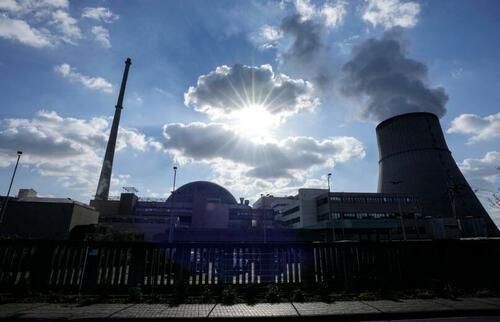
Authored by Magyar Nemzet's Gergely Kiss via Remix News,
With the closure of Germany’s last three nuclear power plants, the country’s 60-year era of nuclear power generation has come to an end. The move was originally planned for the end of last year. However, due to uncertainty over energy supplies in the wake of the Russian-Ukrainian war and sanctions, the coalition government extended the deadline until after winter.
For a long time, nuclear energy has been one of the most divisive areas of energy policy in the EU’s supply. The technology offers stable energy supplies and has positive environmental and economic indicators, but the radical Green parties of Europe have worked hard to convince many that these plants should be closed.
This has been achieved mainly in Germany and Austria. Downsizing has begun and further investment has become impossible. Reality, however, has shown that this ideology-driven energy policy comes at a heavy price. It was not by chance that energy policy expert Oliver Hortay recently recalled an estimate by a Berkeley University researcher that the social cost of German nuclear plant closures had already reached $12 billion a year.
The threat of energy shortages in Europe has led to a change in the perception of nuclear power among EU citizens.
In Germany, for example, the percentage of people who oppose nuclear power has fallen from 65 to 20 percent. But it seems that the will of the electorate does not matter.
“It’s a black day for climate protection in Germany,” Jens Spahn, a conservative member of the CDU, told RTL television the other day.
It is hard to talk about a green transition when carbon emissions are rising.
The huge expansion of solar and wind capacity in Germany is no guarantee of security of supply. The country is increasingly using coal instead of Russian gas. In fact, mines that had previously been closed down have had to be reopened, and a German energy company has even started to dismantle a wind farm to allow for the expansion of a neighboring coal mine.
On average, 30,000 tons of coal are transported daily by trains from North Sea ports to large power stations across Germany. Last year, the war caused the country to increase its coal imports by 8 percent to 44.4 million tons. These are the hard facts.
The Greens went after gas boilers, too. They will now be banned in German homes from 2024.
Greens say they cannot meet their climate commitments otherwise.
However, it is coal-fired power stations, not residential gas boilers, that threaten climate targets.
Péter Szijjártó, the Hungarian minister of foreign affairs and trade, often warns that it is impossible to supply the economy with gas or oil, or even to heat houses and apartments, with ideology or political statements instead of actual supply chains.
In other words, the Hungarian government continues to treat energy security as a physical and not an ideological issue. That means it is not willing to give up working, proven and reliable sources.
An ideology-driven energy policy is very expensive, has harmful consequences, and in the future, could even end with us freezing in our homes if an especially cold winter hits Europe.
Authored by Magyar Nemzet’s Gergely Kiss via Remix News,
With the closure of Germany’s last three nuclear power plants, the country’s 60-year era of nuclear power generation has come to an end. The move was originally planned for the end of last year. However, due to uncertainty over energy supplies in the wake of the Russian-Ukrainian war and sanctions, the coalition government extended the deadline until after winter.
For a long time, nuclear energy has been one of the most divisive areas of energy policy in the EU’s supply. The technology offers stable energy supplies and has positive environmental and economic indicators, but the radical Green parties of Europe have worked hard to convince many that these plants should be closed.
This has been achieved mainly in Germany and Austria. Downsizing has begun and further investment has become impossible. Reality, however, has shown that this ideology-driven energy policy comes at a heavy price. It was not by chance that energy policy expert Oliver Hortay recently recalled an estimate by a Berkeley University researcher that the social cost of German nuclear plant closures had already reached $12 billion a year.
The threat of energy shortages in Europe has led to a change in the perception of nuclear power among EU citizens.
In Germany, for example, the percentage of people who oppose nuclear power has fallen from 65 to 20 percent. But it seems that the will of the electorate does not matter.
“It’s a black day for climate protection in Germany,” Jens Spahn, a conservative member of the CDU, told RTL television the other day.
It is hard to talk about a green transition when carbon emissions are rising.
The huge expansion of solar and wind capacity in Germany is no guarantee of security of supply. The country is increasingly using coal instead of Russian gas. In fact, mines that had previously been closed down have had to be reopened, and a German energy company has even started to dismantle a wind farm to allow for the expansion of a neighboring coal mine.
On average, 30,000 tons of coal are transported daily by trains from North Sea ports to large power stations across Germany. Last year, the war caused the country to increase its coal imports by 8 percent to 44.4 million tons. These are the hard facts.
The Greens went after gas boilers, too. They will now be banned in German homes from 2024.
Greens say they cannot meet their climate commitments otherwise.
However, it is coal-fired power stations, not residential gas boilers, that threaten climate targets.
Péter Szijjártó, the Hungarian minister of foreign affairs and trade, often warns that it is impossible to supply the economy with gas or oil, or even to heat houses and apartments, with ideology or political statements instead of actual supply chains.
In other words, the Hungarian government continues to treat energy security as a physical and not an ideological issue. That means it is not willing to give up working, proven and reliable sources.
An ideology-driven energy policy is very expensive, has harmful consequences, and in the future, could even end with us freezing in our homes if an especially cold winter hits Europe.
Loading…





